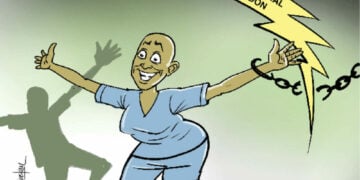Every first week of August, from 1st to 7th day of the month, the world marks Breastfeeding Week. It’s a moment set aside each year to highlight the importance of breastmilk for babies, with emphasis on why nursing mothers must prioritise breastfeeding. The week inherently calls attention to breastfeeding as a cornerstone of child survival, growth, and healthy development.
Breast milk, a natural gift from God to child, secreted and synthesized by the mother’s mammary gland, and delivered to the neonate for its optimal protection, nourishment and development, is considered the most complete source of infant nutrition. It effectively ensures the child’s health and survival and is packed with nutrients and antibodies that protect infants from diseases. Studies show that breastfed children do better on intelligence tests and are less likely to be overweight or obese later in life.
In many Nigerian bedrooms, especially among couples still in their childbearing years – and we do have many of them, there is an age-old debate about who truly owns the breast- the father or the baby. While I am not qualified to give a definite answer, I know for a fact that breastfeeding is fundamental to a child’s survival, growth and development.
So why shouldn’t women prioritise breastfeeding when it has enormous benefits not just for their infants and children but for themselves too? Why shouldn’t they when it has been proven that women who breastfeed have a reduced risk of cancer and type II diabetes?
Poorly Supported, Misunderstood
Yet, despite its proven value and strategic importance to the survival of infants and children, breastfeeding is still poorly supported and widely misunderstood.
The need to address this informs the decision by the World Health Organisation (WHO) to mark breastfeeding week annually in collaboration with critical partners like the United Nations Children’s Fund (UNICEF), Ministries of Health, and Civil Society Partners worldwide.
But why should the world be concerned about breastfeeding? Because the numbers are telling. According to the World Health Organisation (WHO), only an estimated 44% of infants 0–6 months old were exclusively breastfed in 2023. WHO also asserts that at least 820,000 under-5 children could be saved annually if all children 0–23 months received optimal breastfeeding.
The Convention on the Rights of the Child makes it clear that every child has the right to good nutrition, a lack of which is believed to be responsible for about 45% of child deaths. Undernutrition is one of the reasons for stunting and wasting among children. A WHO report indicates that in 2022, 149 million children worldwide were stunted and 45 million were wasted.
If these alarming statistics don’t underscore the need to accord topmost priority to breastfeeding specifically and the welfare of children generally, then nothing else will. Therein lies the significance of the World Breastfeeding Week.
As it is done about this time every year, the world is marking breastfeeding week this week. The theme for the 2025 edition is “Prioritise Breastfeeding: Create Sustainable Support Systems.”
There is an urgent need to build lasting systems that support mothers in breastfeeding successfully, whether at home, in healthcare settings, or at workplaces.
Nursing mothers need to adhere strictly to optimal breastfeeding, which entails starting breastfeeding within the first hour of birth, ensuring exclusive breastfeeding by feeding only breastmilk to infants for the first six months without giving water or any other foods or fluids, and introducing safe, nutritious complementary foods while continuing to breastfeed for up to at least 24 months.
Nigeria’s Appalling Data
What is the state of breastfeeding in Nigeria? How has that impacted the lives of the infant? Although over 90% of Nigerian women have ever breastfed their babies, only 1 in 3 babies is given breastmilk in the first hour after birth, and only 1 in 3 babies is exclusively breastfed for up to six months. That is far behind the national target of 65% by 2025.
Statistics from the National Demography and Health Survey (NDHS) show that early breastfeeding initiation declined from 42 per cent in 2018 to 36 per cent in 2023, with exclusive breastfeeding rates remaining stagnant at 29 per cent in 2018 and 2023.
Though the WHO and UNICEF recommend breastfeeding for at least two years, many Nigerian babies are weaned far too early. Why? A mix of societal, economic and institutional factors.
Turning The Tide
To turn the tide, we must build systems that provide sufficient opportunities, including flexible maternity leave, for working-class nursing mothers to breastfeed their babies exclusively.
Good enough, ten states-Lagos, Kwara, Ekiti, Oyo, Cross River, Kaduna, Niger, Ondo, Enugu and Plateau- have extended paid maternity leave for up to six months for public workers. There is no reason why other states should not do the same. It’s a move worth emulating.
Twenty-six out of the 36 states in Nigeria have yet to create an enabling environment for effective breastfeeding, which includes paid maternity leave, breastfeeding breaks, and workplace facilities. Therefore, mothers’ ability to breastfeed their babies optimally is undermined. This has a telling impact on child health across the country. Breast Milk is central to child survival and development. We must support mothers to ensure effective breastfeeding.
As the world marks this year’s World Breastfeeding Week, the need for the government to provide all the necessary tools for health workers to support and encourage mothers to prioritise breastfeeding cannot be overstated.
But this responsibility doesn’t lie with governments alone. Whether as mothers, fathers, guardians, policy makers or community leaders, everybody has a role in enabling a breastfeeding-friendly environment, and we must be seen playing those roles. Creating a breastfeeding-friendly culture starts with acknowledging that breastfeeding is not just a mother’s duty but a shared responsibility. We must mark World Breastfeeding Week not just in words but in action.
Beyond rhetoric, let’s show commitment to action. We need stronger policies, better health education, workplace reforms, and active male involvement. The future of our children depends on it. The time to change the narrative is now.
The Champions From Yobe
The emergence of three teenage girls from Yobe State as winners of global competitions has added to the list of heartwarming stories from Nigeria. Nafisa Abdullah Aminu (17), Rukayya Muhammad (15) and Hadiza Kashim have brought honour to their parents, Yobe State and Nigeria. They have added to the wonderful stories from Nigeria that began with the victory of the Women’s Football team, followed by that of the Female Basketball team. Indeed, the women are making Nigeria proud. Their feats underscore the need to accord priority to the child-girl. It is therefore sad that while we celebrate Nafisa, we are still battling with an alarming number of malnourished children, with concerns that 300,000 children are at risk of hunger as the World Food Programme shut down operations in Borno and Yobe States.





